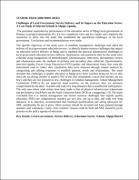| dc.description.abstract | TUSIIME FRED (2008-M092-20102)
Challenges of Local Government Service Delivery and Its Impact on the Education Sector: A Case Study of Selected Schools in Mpigi, Uganda.
The persistent unsatisfactory performance of the education sector of Mpigi local government in Primary Leaving Examinations (P.L.E), low completion rates and low intake rates implored the researcher to delve into the study that established the operational challenges of the local government. Conclusions and recommendations were made.
The specific objectives of the study were: to establish management challenges that affect the delivery of local government education service ; to identify human resource challenges that impact on education service delivery in Mpigi and to establish the physical infrastructure challenges to local government education service delivery. Quantitative and qualitative data for the study were collected using triangulation of methodologies. Questionnaires, interviews, documentary review and observations were the methods of primary and secondary data collection. Questionnaires, interview guides, Focus Group Discussion (FGD) guides and observation check lists were the instruments used to collect data. Qualitative data were analysed through content analysis by categorising and tallying responses to establish patterns, trends and relationships. The study revealed that challenges to quality education in Mpigi arise from: teachers being too few to ably teach the escalating number of pupils-(79% of the total respondents concur that teachers are too few); and they are not exposed to new challenges in syllabus management. School Management Committees (SMCs) do not supervise head teachers; on the contrary, they are seriously compromised by the latter. Teachers still walk very long distances due to insufficient staff quarters. The only area where wide strides have been made is that of physical infrastructure (classrooms and pit latrines), which have put the Pupil-Classroom Ratio (PCR) at a staggering 1:70. The study concluded that it is mainly management and human resource challenges that impede quality education. SMCs are compromised; teachers are very few, not up to date, and walk very long distances. It is, therefore, recommended that minimum qualifications and sitting allowance for SMC membership be put in place. More teachers should be recruited and kept updated through seminars and workshops. Lastly, more teachers‟ houses could be built and SNE should be given priority on the policy agenda of education.
Key Words: Local Government, Service Delivery, Education Sector, Schools, Mpigi District | en_US |


